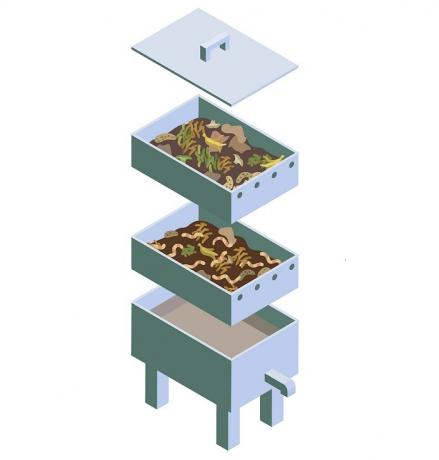Composting is a method of organic solid waste recycling, which are reused for the production of fertilizers and fertilizers. The compost product, called humus, is an efficient natural fertilizer.
The composting process is usually done naturally, through the decomposition of organic waste by microorganisms, such as bacteria and fungi, for example. Waste used can be of animal or vegetable origin.
The compost technique is applied as an alternative that fits the concept of development sustainable environment, as provided for in the legislation of the National Solid Waste Policy (PNRS).
In addition to the composting plants, which are used to recycle large amounts of organic waste (such as food scraps or garden waste), interested people can also easily compost at home, using buckets or boxes.
How to compost?
To make composting at home, you need a composter, which can be purchased or made at home with few materials. It is important to know that composting can be done with or without worms. In general, the use of earthworms speeds up composting, but the process occurs equally well if you decide to do without them.
The composter must have three containers. In the first two must be placed dry leaves, earth and organic residues. If you decide to use worms, they must be placed in these same boxes.
The result of composting, the humus, will be stored in the last box and must be collected by the tap installed in this container.
See a domestic composter in the image below:
 The composter can be purchased or made at home, reusing boxes or buckets.
The composter can be purchased or made at home, reusing boxes or buckets.
What is humus?
Humus is the final product of the composting process, a liquid substrate resulting from the fermentation of organic waste used in composting.
The use of humus in watering plants and in the soil is very beneficial as it acts as a natural fertilizer. It has the ability to increase the amount of nutrients in the soil, help control the temperature of the soil, in addition to helping to combat pests that can be harmful to the healthy development of plants.
What types of waste can be used?
In general, organic waste can be used in the process, but it is necessary to be aware of the amounts used because the excessive use of some can harm the quality of the compost.
Remains of vegetables and fruits, egg shells, teas, coffee grounds, dry leaves, sawdust and grass can be freely placed in the compost bin. Avoid excess residue from citrus fruits or cooked food.
Meat and dairy products must not be deposited in the compost bin. It is also necessary to avoid wet food or other residues that can cause mold or mildew in the compost bin.
Learn more about the humus.
Stages of the composting process
The composting process is usually divided into three main phases: mesophilic, thermophilic and maturation.
mesophilic phase
It is the beginning of the proliferation of fungi and bacteria that will be responsible for metabolizing the simplest molecules of organic matter. At this stage, the temperature in the composters is approximately 40°C. The duration of this step is 15 days.
thermophilic phase
This is the longest phase, lasting an average of two months. Organic material is subjected to thermophilic microorganisms, which are capable of surviving temperatures of up to 70°C. The most complex molecules are degraded at this stage, in addition to the elimination of most pathological agents.
maturation phase
It also lasts an average of two months and is characterized by a drop in microbial activity, as well as a decrease in temperature in the composters. During this step the compost is transformed into humus free of heavy, toxic and pathogenic metals.
Composting Benefits
Some of the key benefits of this reuse technique include:
- prevent the depletion of landfills;
- it consists of a natural process, without the use of chemical or toxic products;
- promotes the recycling of nutrients to the soil;
- helps to reduce soil, water and air pollution;
- helps control the population of disease-carrying animals,
- it avoids waste, transforming waste into new materials that are useful for other areas.
know more about recycling and landfill.
Importance of composting for the environment
In addition to all the benefits listed above, composting is also very important to help preserve the environment.
The organic waste that is deposited in landfills generates methane gas during the decomposition process and this gas contributes to the aggravation of the greenhouse effect, which causes an increase in the Earth's temperature.
Also read the meaning of organic waste and meet others ways to help preserve the environment.

